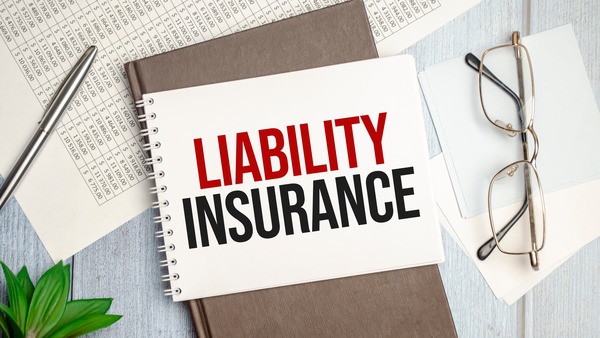Contractual liability insurance and general liability insurance are two different types of insurance coverages. Contractual liability protects claims arising out of contracts, whereas general liability protects against third-party claims of injury or property damage. Depending on the level of risk, small business owners may want to have both types of insurance to better protect their business interests.
Contractual Liability Insurance
As a business owner, you may get involved in signing contracts. When you do, there is liability involved. An insurance policy that protects against these liabilities is known as contractual liability insurance.
For example, assume you are an electrician who is hired by a general contractor to do the work on a house for a client. You sign a contract on behalf of your business with the general contractor. The contract, also known as an agreement, means that your company takes on the financial responsibility for any claim that arises resulting from your work. If you don’t have an insurance policy that covers contractual liability, you’d have to pay claims out of pocket, but with contractual liability insurance, your company is protected.
Contractual liability insurance is a type of coverage that business owners add to a general liability policy to get more protection.
General Liability Insurance
General liability insurance is a common business insurance policy that protects a business owner from third-party claims. In these claims, parties may allege that your business operation is responsible for their property damage or injuries. General liability insurance is often called “slip and fall coverage” because one of the common claims covered is when someone slips on your business premises and gets hurt. You are liable for their injuries.
What Does Contractual Liability Insurance Cover?
Contractual liability insurance covers losses that occur when you have assumed liability via a signed contract. It will cover liabilities and losses for things like:
- Third-party bodily injury
- Third-party property damage
When it comes to these third-party liabilities, you are often assuming them on a property other than your own or a property rented to you. The general contractor or the landlord doesn’t want to assume the risk of your job while the work is being done. This is why they have you sign a contract to “hold harmless.” Hold harmless simply means that you agree to take the liability responsibility away from them.
What Does General Liability Insurance Cover?
General liability insurance is a policy that you get to protect you from most third-party claims. It covers losses such as:
- Third-party bodily injury
- Third-party property loss
- Personal injury, such as libel and slander
These are innate risks that every business owner has and should get protection for. You never know when someone will slip and fall in your establishment or if you get sued for copyright infringement.
How Are Contractual Liability and General Liability Different?
There is little difference between contractual liability and general liability insurance coverage. Both coverage types protect against third-party risks, but when it comes to contractual liability, you are assuming a risk that might otherwise be someone else’s if you didn’t take the liability on.
In the example where a general contractor hires an electrician to do work on a client’s home, the general contractor has assumed liability while working on the property. This means that any third-party claim is the responsibility of the contractor. If the electrician doesn’t assume the liability and a claim arises, it is the general contractor or his insurance that must pay the claim. But if the contractor has the electrician sign a hold harmless agreement, the general contractor transfers the liability for claims to the electrician.
From a claims perspective, there is little difference. Both coverages protect against third-party claims of loss. They both protect against third-party injury or property damage. It’s just that the contractual liability coverage is assuming what might otherwise be another party’s risk.
Understanding Contractual Liability Insurance
There are several components to understanding contractual liability insurance and how contracts affect it. It’s important to understand each to make sure you understand what your liability is.
The Indemnity Agreement or “Hold Harmless” Clause
The indemnity agreement is the part of the contract that transfers liability to the signor of the contract. It means that you take responsibility for third-party claims that may arise during the course of completing the contract. In the case of the electrician who signs a contract with a general contractor, the electrician transfers the liability to himself by way of the indemnity agreement. This says that you will take on the responsibility of claims.
Contractual Liability Endorsements
A contractual liability endorsement is an insurance endorsement that you add to a commercial general liability insurance policy. Because most commercial general liability insurance policies exclude liabilities assumed by contract, you need to make sure that your policy has this endorsement added if you do work via contract.
There are two types of contractual liability endorsements:
- Standard contractual liability endorsement: This endorsement specifies which contracts you add and thus list in the insurance policy. Only those contracts listed will get the benefit of coverage.
- Blanket contractual liability endorsement: This endorsement covers all contracts and doesn’t require you to list contracts. This is typically a more expensive endorsement because it offers broader coverage.
Contractual Liability Insurance Limitations and Exclusions
All business owners entering into contracts and obtaining contractual liability insurance should be aware of the limitations and exclusions of the policy. Limitations and exclusions are instances the policy won’t cover, meaning claims may be the whole responsibility of the contract signor.
Two common limitations are incomplete contracts and coverage limits.
Incomplete Contracts
Contractual liability insurance isn’t going to pay a claim if you don’t live up to your end of the contract terms. You are still liable to maintain your agreement as a business owner. If the contract is incomplete, the insurance company may also deny a claim leaving you to pay it on your own or fight in court over who is responsible.
Coverage Limits
The contractual liability insurance coverage will only pay up to the policy limits. This means that claims with values over the coverage limits are still the liability and responsibility of the policy owner. Small business owners should talk to their insurance agents to ensure that they have the right amount of coverage to protect against third-party risks.
Getting the Right Coverage
To properly insure the business, a small business owner will want to start with a general liability insurance policy. This protects against the biggest risks the company will face. Talk to an insurance agent to get the right coverage limits in place to ensure that you won’t be out of pocket should a claim arise.
Once you have a general liability insurance policy in place, ask about a contractual liability insurance endorsement. Your agent will review the two types of endorsements, a standard endorsement or a blanket endorsement. Select the endorsement that best protects your business while meeting your budget concerns.
Your insurance agent may ask to review common contracts that you have. His goals is to ensure that they are complete contracts and that you set the right limits in place. Use your agent as a resource to help mitigate your risk and run your business with the most amount of protection.











